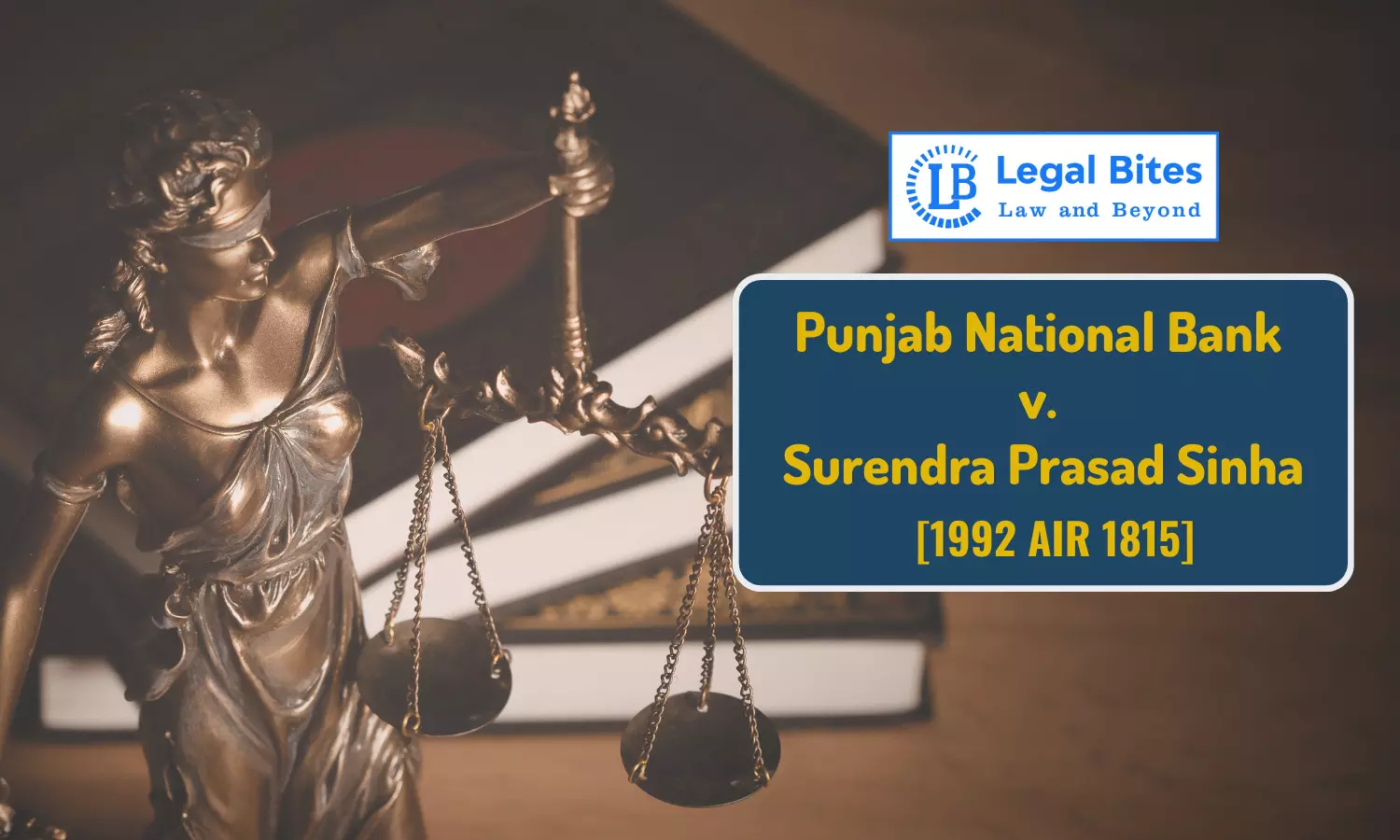Case Study: Punjab National Bank v. Surendra Prasad Sinha (1992) | Section 3 of the Limitation Act, 1963
The case study presented below underscores that the focal point of limitation rules is to limit remedies rather than extinguish rights.

The case study presented below underscores that the focal point of limitation rules is to limit remedies rather than extinguish rights.
Petitioner: Punjab National Bank & Ors.
Respondent: Surendra Prasad Sinha
Bench: Justice K. Ramaswamy, Justice B.P. Jeevan Reddy
Citation: 1992 AIR 1815
Date of Judgment: 20/04/1992
Facts
The case is related to a loan transaction whereby the respondent in this case and his wife were named as the guarantors. The principal debtor had defaulted and thus the payment of the loan became due. The bank then adjusted the amount of the unpaid loan from the fixed deposit that the respondents (meaning the guarantors in the loan transaction) held with the bank. The said respondent accused the appellants of embezzlement as the loan had become time-barred and it was illegal for the bank to deduct money from the respondent’s fixed deposit upon the default of the principal debtor.
The appellant in this case is the bank which has filed a criminal appeal by special leave to challenge the High Court’s order whereby it refused to quash the complaint filed against it by the respondent under Section 409, 109, 114 of the IPC.
Issues
- Whether the debt owed to the bank by the principal debtor was time-barred under Section 3 of the Limitation Act, 1963.
- Whether it was unlawful to recover it from the fixed deposit of the guarantors.
Laws Applied
Since the dispute was regarding deciphering the extent to which the creditor has the right to recover his debt based on the limitation period prescribed as per the Limitation Act, 1963; the law applied was Limitation Act, 1963.
Section 3 of the Limitation Act, 1963 states the bar of limitation. However, there is a scope for condonation of delay which can be allowed by the court on a case-to-case basis. This provision had to be interpreted by the court in this case.
Arguments
Petitioner
The bank stated that it had acted as per the conditions that had been stated in the contract and thus it was valid for it to deduct the amount from the guarantors’ fixed deposit. The right to recover exists with the bank and thus it had the right to deduct the money. The parties then approached the court seeking resolution of their dispute to decipher whether it was legal for the bank to deduct the money or did the provisions of the Limitation Act, 1963 bar it from doing so since the same had become time-barred as per Section 3.
Respondent
A private complaint had been filed against the bank stating that since the loan had become barred by limitation on 5.5.1987, the respondent’s liability had also been extinguished as it is co-extensive with that of the principal debtor. Thus, it was illegal for the bank to deduct money from the respondent’s fixed deposit. The deduction was made by the bank on 14.1.1989.
Judgment
The apex court in this case emphasized the true essence of Section 3 of the Limitation Act, 1963 which states that the provision seeks to restrict the remedies and not annihilate the rights of the parties.
Therefore, going by this explanation, it can be stated that the right to debt continues regardless of the remedy being time-barred unless the right in question itself gets obliterated. There is no vanishing of the time-barred debts but Section 3 only extinguishes the enforcement remedy. The court clarified that Section 3 is more about restricting the remedies and not the creditors’ rights altogether. The liability continues till the same is paid even if the debt recovery remedy is time barred. The court stated that there was no ground for initiating a criminal case against the bank as it had no criminal intent behind deducting the money which was due to it. The court enunciated the importance of avoiding any sort of needless oppression and harassment by way of any legal proceedings.
Thus, the court held that the charges brought against the appellants by the respondent were baseless and attempted to harass them prima facie. The appeal was thereby allowed and the complaint filed against the appellant was quashed.
Important Links

